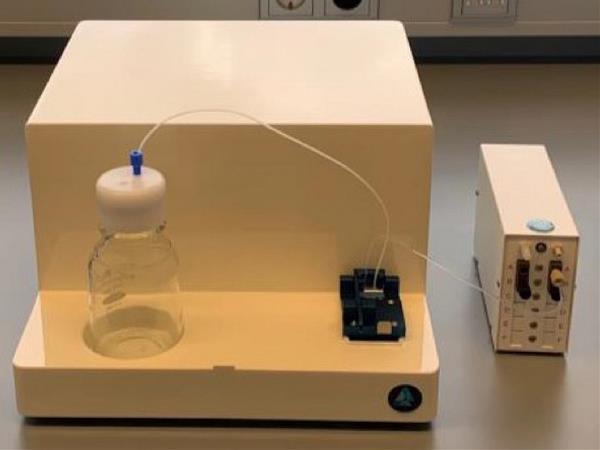Biosensors for detecting enzymes, DNA and viruses
This project is the result of a collaboration between Smart Sensor Systems, TNO and the company Delta Diagnostics.
Centre of Expertise Digital Operations & Finance

This project is the result of a collaboration between Smart Sensor Systems, TNO and the company Delta Diagnostics. In a short period of time, this company has become an important player in the further development (TNO spin-off development) as well as the further market introduction of these Microring Resonators (MRRs) as a point-of-care diagnostic technique. This project is part of the Smart Health research line of the research group Smart Sensor Systems.
The collaboration with the research group Smart Sensor Systems has created additional opportunities to further research and develop the application of the technology. For example, this cooperation will expand the measurement of the concentration of bio signalling cells for a range of biological systems. This line of research is developed in close cooperation with researchers from the research group Smart Sensor Systems. Engineering Physics and Process and Food Technology bachelor students are actively involved in this research on an ongoing basis. Together with more experienced researchers, they answer the most current research questions that arise directly from the cooperation between the research group and the company Delta Diagnostics.
The technique is seen as an important and innovative step, because the fast future label-free detection of proteins in a complex liquid such as blood/serum, which makes it possible to measure the concentration of biological proteins in real-time and parallel as reversible, offering unprecedented possibilities for rapid diagnostics. The technique is both elegant and versatile. Silicon micro rings are placed on a chip and laser light is coupled in via an Optical Coupling Grating. The optical path length of the micro-ring depends both on the length of the ring and on the refractive index. Only a very narrow wavelength range of a (tunable) IR laser is resonant with the optical path length. This allows for a high precision reading of the optical path length. A biological detection element (biomolecule) can be attached to the rings by covalently binding with the silicon atoms of the ring. The analyte (the biomolecule whose concentration we want to measure) fits the detection element in a unique stereochemical way. This makes the optical path length of the ring uniquely dependent on the concentration of the detection element.
This means that in the future it will be possible to provide hospitals and family doctors with fast and accurate point-of-care diagnostics. The multidisciplinary nature of this research provides an informative and innovative research field, bringing together expertise and skills from the areas of micro and nanotechnology, as well as photonics, biophysics and biochemistry.
Objective
Explore and develop biosensors for detecting enzymes, DNA and viruses.
End product/intended outcomes
- setting up a lab with micro-ring resonators
- test the micro-ring resonator
- (co-)write grant applications
- Provide high-quality measurement results for relevant biomolecular systems. The proteins IL 10, IL 20 are relevant for project I-chip.
Project leader
Lodewijk Arntzen
Duration
01-02-20 to 01-02-22
Degree programmes and/or minors involved
TIS - Engineering Physics wants to specialise in: Nanotechnology/Microtechnology and Photonics, largely applicable in a medical context. The micro-ring resonator (MRR) is a project within the Microtechnology, Processing and Devices (MPD) research minor and the Nanotechnology subject cluster.
Funding
Funding by Ministry of Education, Culture & Science, RAAK MKB funds, NWA I-Chip
Partners
- ILT (advisor)
- Bart de Boer and Peter Harmsma, Delta Diagnostics
- Erasmus MC - I-Chip
Student project team
Students from the research minor Microtechnology, Processing and Devices (MPD) and the graduation profile Nanotechnology are working on current research questions, formulated and assisted by experienced researchers from the research group Smart Sensor Systems, in consultation with Delta Diagnostics.